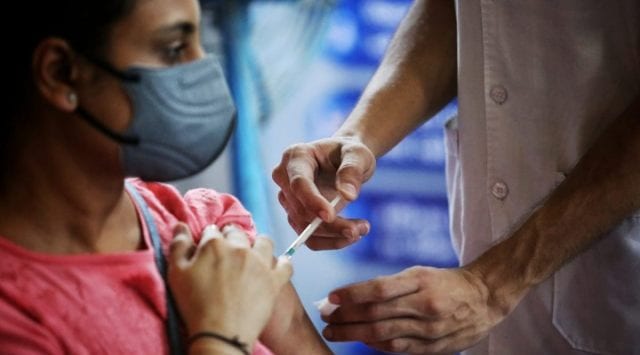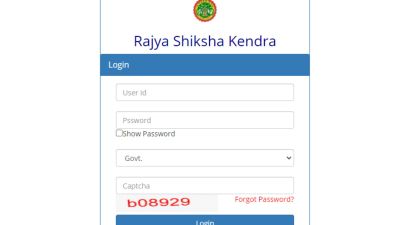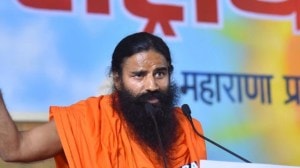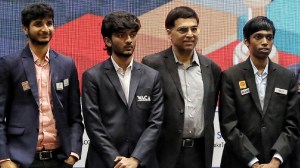- India
- International
Protecting the right to access vaccines
Vaccine equity is the need of the hour. Centre must take concrete action in this regard, something which has been missing recently
 This move will allow imports of shots developed by Pfizer, Johnson & Johnson and Moderna with which India has been in talks with little success. (File)
This move will allow imports of shots developed by Pfizer, Johnson & Johnson and Moderna with which India has been in talks with little success. (File)Written By Kashish Aneja and Nikhil Pratap
India is suffering from a devastating wave of Covid-19 infections and critical shortages in medical supplies. In these dire circumstances, access to vaccine must be considered an essential facet of the human right to health under Article 21 of the Constitution. Universal vaccination is the only long-term solution to save human lives and avert an impending catastrophe. However, despite being called the vaccine factory of the world, India has been unable to maintain a sufficient supply of vaccines. A target of immunising 30 crore people by July 2021 was made by the Centre in December 2020. Less than three months from the deadline, only 25 per cent of the target has been met. Vaccine shortages have stalled the immunisation process and greatly exacerbated the current crisis. The average inoculation has dropped from 35 lakh doses each day in the first week of April to 16 lakh daily doses in early May. The central government has failed in safeguarding the constitutional right to health of its citizens.
The problem is so grave that the Supreme Court has called it an “unprecedented humanitarian crisis” and has taken suo motu notice of the crisis. In a rare order on April 30, the Court censured the central government and asked it pointed questions on its policy regarding vaccine availability, accessibility, and pricing. It is imperative now that the Centre is held accountable for its decision. It must immediately course correct and take steps to increase access to vaccinations.
It is widely suggested that, to increase vaccine production, compulsory licensing or waiver of intellectual property (IP) on vaccines should be allowed. In October 2020, a joint proposal was put forth at the World Trade Organisation by India and South Africa suggesting a waiver of certain IP rights in relation to the prevention, containment or treatment of Covid-19. After much resistance, the United States recently announced partial support for the waiver and the European Commission has followed suit by expressing its interest. The Supreme Court has also asked the Centre to consider the possibility of compulsory licensing of vaccines.
Compulsory licensing and IP waivers are effective solutions for the shortage of drugs or medicines, as they are relatively easy to manufacture. However, unlike drugs, the manufacturing of vaccines is a complicated process. It involves nuanced technical details, including cell lines and raw materials which are not necessarily protected by patents. Some processes and information, such as details of clinical trials, may also be protected by trade secrets. Compulsory licences by themselves will not be sufficient for generic manufacture of vaccines. The generic manufacturers will need additional technical know-how of the manufacturing process, information on trials and technology transfers. They will also have to go through the time-consuming process of independent vaccine trials and safety tests. Alternatively, the generic manufacturers will have to independently reverse engineer the vaccine. This is a complicated time-consuming process and the delay itself will act as a substantial barrier to prompt access to vaccines.

An effective way to increase vaccine production is to shift our focus to the indigenously developed vaccine, Covaxin. Studies have shown that the vaccine is potentially effective against the new British, Brazilian and Indian variants of coronavirus. Covaxin has been jointly developed by Bharat Biotech and Indian Council for Medical Research (ICMR)-National Institute of Virology and has been party funded by the Centre. We do not know the exact details of government funding, but the IP on the vaccine has already been shared with ICMR. As a result, it can be presumed that the Centre has substantial control over the IP and technological know-how of Covaxin. To increase its production and access, the Centre can waive the enforcement of its IP rights in Covaxin and make all technical details and trade secrets of the manufacturing and approval process available publicly. This way generic manufacturers can commence production using this information, without being encumbered by the technical impediments discussed earlier.
The support for coercive steps like compulsory licensing and IP waiver is based on an underlying assumption that vaccine manufacturers are denying voluntary licences. However, these coercive steps can be avoided if the Centre ensures that vaccine manufacturers can grant a sufficient number of voluntary licences. Therefore, instead of generic manufacturing, vaccine production may be scaled up by utilising private sector capacity and issuing prompt voluntary licenses.
Poorly planned procurement and delayed regulatory approvals have also marred access to vaccines in the country. Until recently, the Centre relied on domestic production of vaccines and consequently did not place orders with foreign manufacturers. Further, the Indian regulators did not grant authorisation to foreign vaccines based on approvals by other government regulators. Instead, the Centre required the vaccines to undergo separate trials. Pfizer, for instance, had submitted its application for regulatory approval in December last year but the regulator declined the company’s request for approval without a local trial. These factors have delayed the process of approvals, slowed down the scaling-up of production and curtailed the supply of vaccines. The Centre has recently recognised approvals granted by some foreign regulators for emergency use in India. Therefore, the immediate next steps should be to expedite domestic authorisations and place bulk orders with foreign vaccine suppliers.
Another major impediment in vaccine accessibility is the revised national procurement and distribution policy. The revised policy allows state governments and private hospitals to procure vaccines directly on variably negotiated commercial terms. The Centre shall continue providing free vaccines to persons over the age of 45 years and the state governments shall immunise the 18 to 44 age group. This revised policy results in differential pricing. In its recent order, the Supreme Court has observed that differential vaccine pricing may cause inequalities and exclusion of the marginalised sections of society. It has observed that “the manner in which the current policy has been framed would prima facie result in a detriment to the right to public health which is an integral element of Article 21 of the Constitution.” As highlighted by the Court, the revised policy potentially leads to chaos and uncertainty. In response to the court’s order, the Centre has submitted that differential pricing will incentivise competition, increase production and consequently reduce prices.
Differential pricing may potentially cause detrimental competition between states, disparity in vaccine procurement and shortage in supplies in some states, resulting in large scale discrimination. Thus, it may adversely affect the right of the citizens to access vaccines. To prevent such outcomes, the Centre must adopt the court’s suggestion that India’s vaccination program should follow a centralised procurement and decentralised distribution strategy, where the centre negotiates the price with vaccine manufacturers and procures vaccines. Once procured, the states may lift the vaccines allocated to it.
Currently, the registration for immunisation can only be done through the Co-WIN portal. This decision increases the already bourgeoning digital divide in the country during Covid-19. Subjecting immunisation to exclusionary conditions violates the right to access vaccines of much of India’s population. In its order, the Supreme Court also flagged the inaccessibility issues fuelled by mandatory digital registrations. In response, the Centre expects citizens to take help from family, friends, NGOs and service centres. Instead of such ad-hoc measures, the Centre must thus consider viable institutional alternatives.
The Centre has expressed its willingness to revisit its vaccine allocation policies if need be in the future. As India records more Covid-19 cases than the rest of the world combined, such willingness must be transformed into concrete actions, which has been recently missing in the overall pandemic response. Given the centrality of vaccines in the global fight against Covid-19, vaccine equity is the urgent need of the hour.
Aneja is a Delhi-based lawyer and consultant for the Public Health Foundation of India and the O’Neill Institute for National and Global Health Law. Pratap is a Delhi-based lawyer.
EXPRESS OPINION
Must Read
More Explained
Apr 23: Latest News
- 01
- 02
- 03
- 04
- 05







































